Ethics, Values, and Collaboration: A Management Report
VerifiedAdded on 2022/12/19
|13
|3629
|22
Report
AI Summary
This report delves into the crucial aspects of ethics, values, and collaboration within a business context. It begins by defining ethics and exploring factors that influence them, followed by an examination of workplace ethics and relevant UK laws. A cause-and-effect essay investigates corporate social responsibility, employee conduct, and the implications of GDPR. The report then shifts focus to the importance of teamwork and collaborative working, emphasizing their significance in achieving organizational goals. The content highlights ethical principles, legal frameworks, and practical applications, providing a comprehensive overview of these interconnected concepts. The report underscores the need for ethical conduct, legal compliance, and effective teamwork to foster a positive and productive work environment.
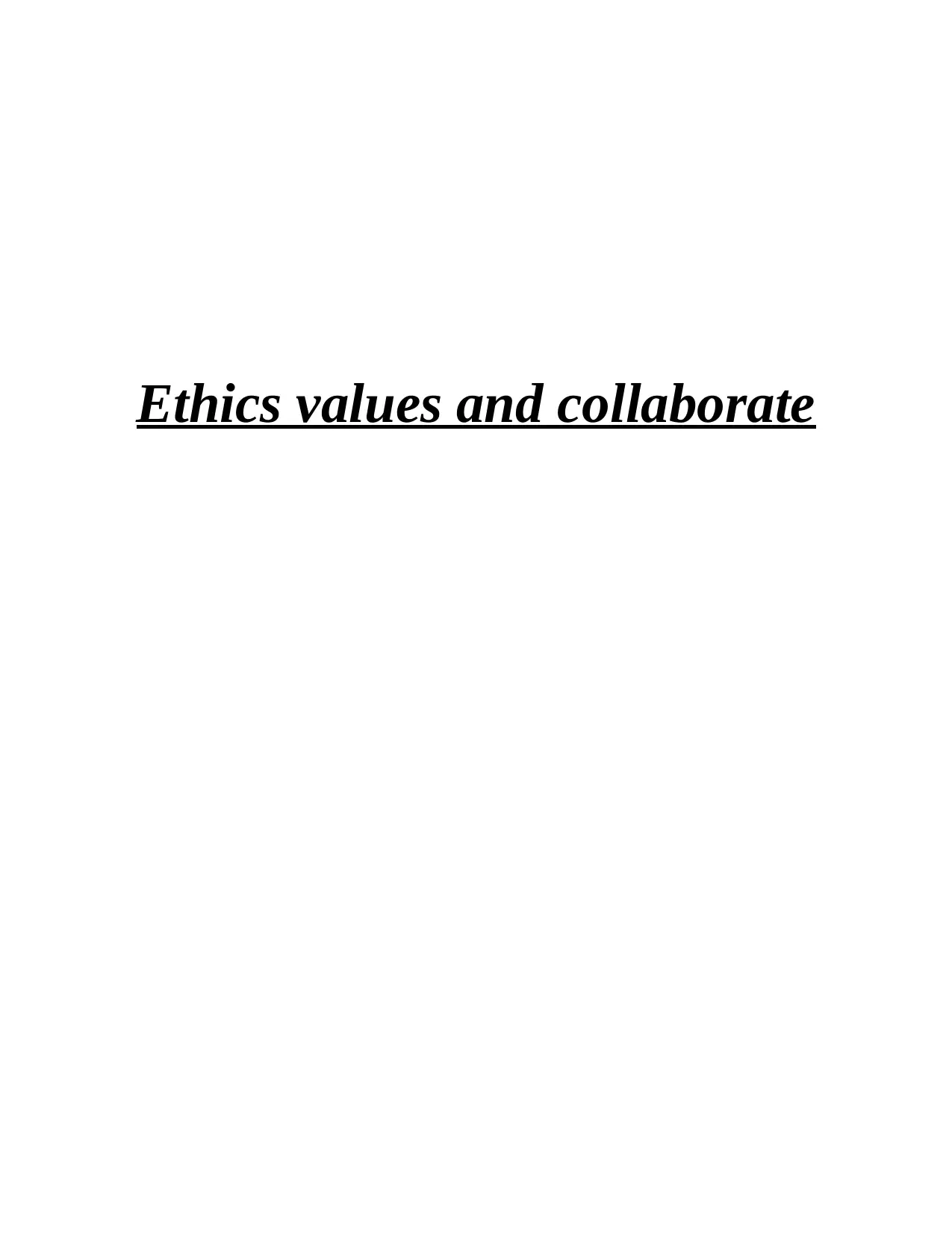
Ethics values and collaborate
Paraphrase This Document
Need a fresh take? Get an instant paraphrase of this document with our AI Paraphraser
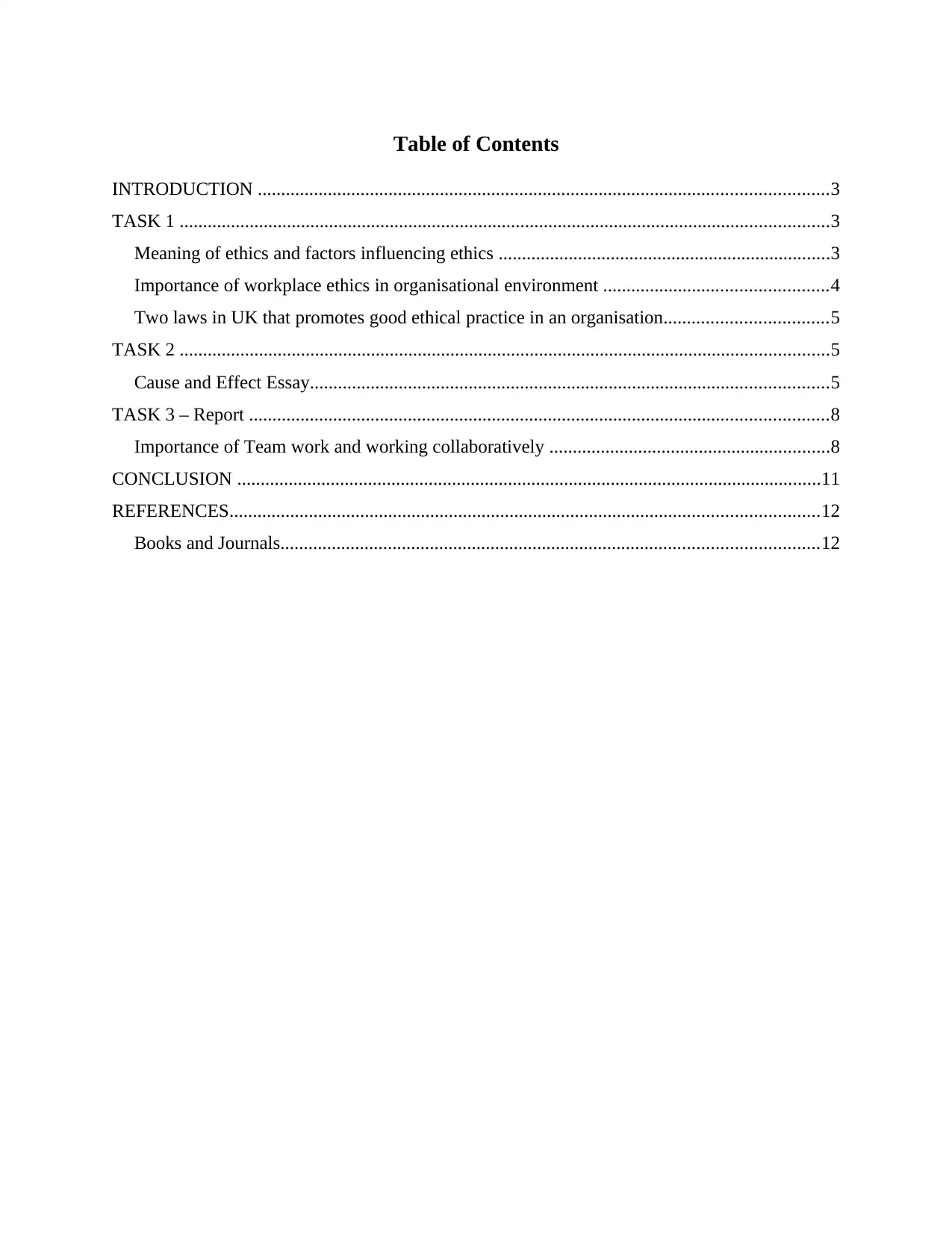
Table of Contents
INTRODUCTION ..........................................................................................................................3
TASK 1 ...........................................................................................................................................3
Meaning of ethics and factors influencing ethics .......................................................................3
Importance of workplace ethics in organisational environment ................................................4
Two laws in UK that promotes good ethical practice in an organisation...................................5
TASK 2 ...........................................................................................................................................5
Cause and Effect Essay...............................................................................................................5
TASK 3 – Report ............................................................................................................................8
Importance of Team work and working collaboratively ............................................................8
CONCLUSION .............................................................................................................................11
REFERENCES..............................................................................................................................12
Books and Journals...................................................................................................................12
INTRODUCTION ..........................................................................................................................3
TASK 1 ...........................................................................................................................................3
Meaning of ethics and factors influencing ethics .......................................................................3
Importance of workplace ethics in organisational environment ................................................4
Two laws in UK that promotes good ethical practice in an organisation...................................5
TASK 2 ...........................................................................................................................................5
Cause and Effect Essay...............................................................................................................5
TASK 3 – Report ............................................................................................................................8
Importance of Team work and working collaboratively ............................................................8
CONCLUSION .............................................................................................................................11
REFERENCES..............................................................................................................................12
Books and Journals...................................................................................................................12
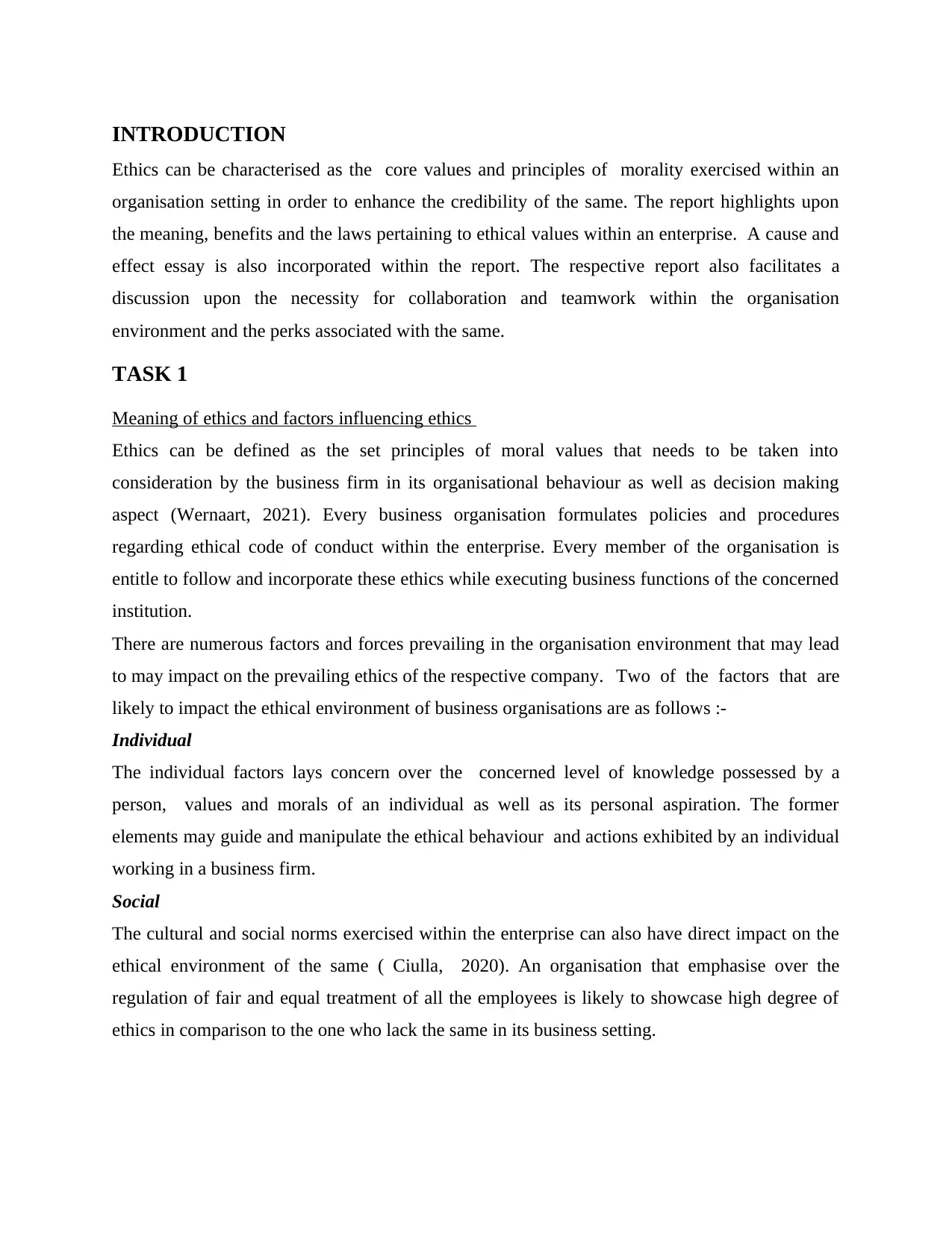
INTRODUCTION
Ethics can be characterised as the core values and principles of morality exercised within an
organisation setting in order to enhance the credibility of the same. The report highlights upon
the meaning, benefits and the laws pertaining to ethical values within an enterprise. A cause and
effect essay is also incorporated within the report. The respective report also facilitates a
discussion upon the necessity for collaboration and teamwork within the organisation
environment and the perks associated with the same.
TASK 1
Meaning of ethics and factors influencing ethics
Ethics can be defined as the set principles of moral values that needs to be taken into
consideration by the business firm in its organisational behaviour as well as decision making
aspect (Wernaart, 2021). Every business organisation formulates policies and procedures
regarding ethical code of conduct within the enterprise. Every member of the organisation is
entitle to follow and incorporate these ethics while executing business functions of the concerned
institution.
There are numerous factors and forces prevailing in the organisation environment that may lead
to may impact on the prevailing ethics of the respective company. Two of the factors that are
likely to impact the ethical environment of business organisations are as follows :-
Individual
The individual factors lays concern over the concerned level of knowledge possessed by a
person, values and morals of an individual as well as its personal aspiration. The former
elements may guide and manipulate the ethical behaviour and actions exhibited by an individual
working in a business firm.
Social
The cultural and social norms exercised within the enterprise can also have direct impact on the
ethical environment of the same ( Ciulla, 2020). An organisation that emphasise over the
regulation of fair and equal treatment of all the employees is likely to showcase high degree of
ethics in comparison to the one who lack the same in its business setting.
Ethics can be characterised as the core values and principles of morality exercised within an
organisation setting in order to enhance the credibility of the same. The report highlights upon
the meaning, benefits and the laws pertaining to ethical values within an enterprise. A cause and
effect essay is also incorporated within the report. The respective report also facilitates a
discussion upon the necessity for collaboration and teamwork within the organisation
environment and the perks associated with the same.
TASK 1
Meaning of ethics and factors influencing ethics
Ethics can be defined as the set principles of moral values that needs to be taken into
consideration by the business firm in its organisational behaviour as well as decision making
aspect (Wernaart, 2021). Every business organisation formulates policies and procedures
regarding ethical code of conduct within the enterprise. Every member of the organisation is
entitle to follow and incorporate these ethics while executing business functions of the concerned
institution.
There are numerous factors and forces prevailing in the organisation environment that may lead
to may impact on the prevailing ethics of the respective company. Two of the factors that are
likely to impact the ethical environment of business organisations are as follows :-
Individual
The individual factors lays concern over the concerned level of knowledge possessed by a
person, values and morals of an individual as well as its personal aspiration. The former
elements may guide and manipulate the ethical behaviour and actions exhibited by an individual
working in a business firm.
Social
The cultural and social norms exercised within the enterprise can also have direct impact on the
ethical environment of the same ( Ciulla, 2020). An organisation that emphasise over the
regulation of fair and equal treatment of all the employees is likely to showcase high degree of
ethics in comparison to the one who lack the same in its business setting.
⊘ This is a preview!⊘
Do you want full access?
Subscribe today to unlock all pages.

Trusted by 1+ million students worldwide
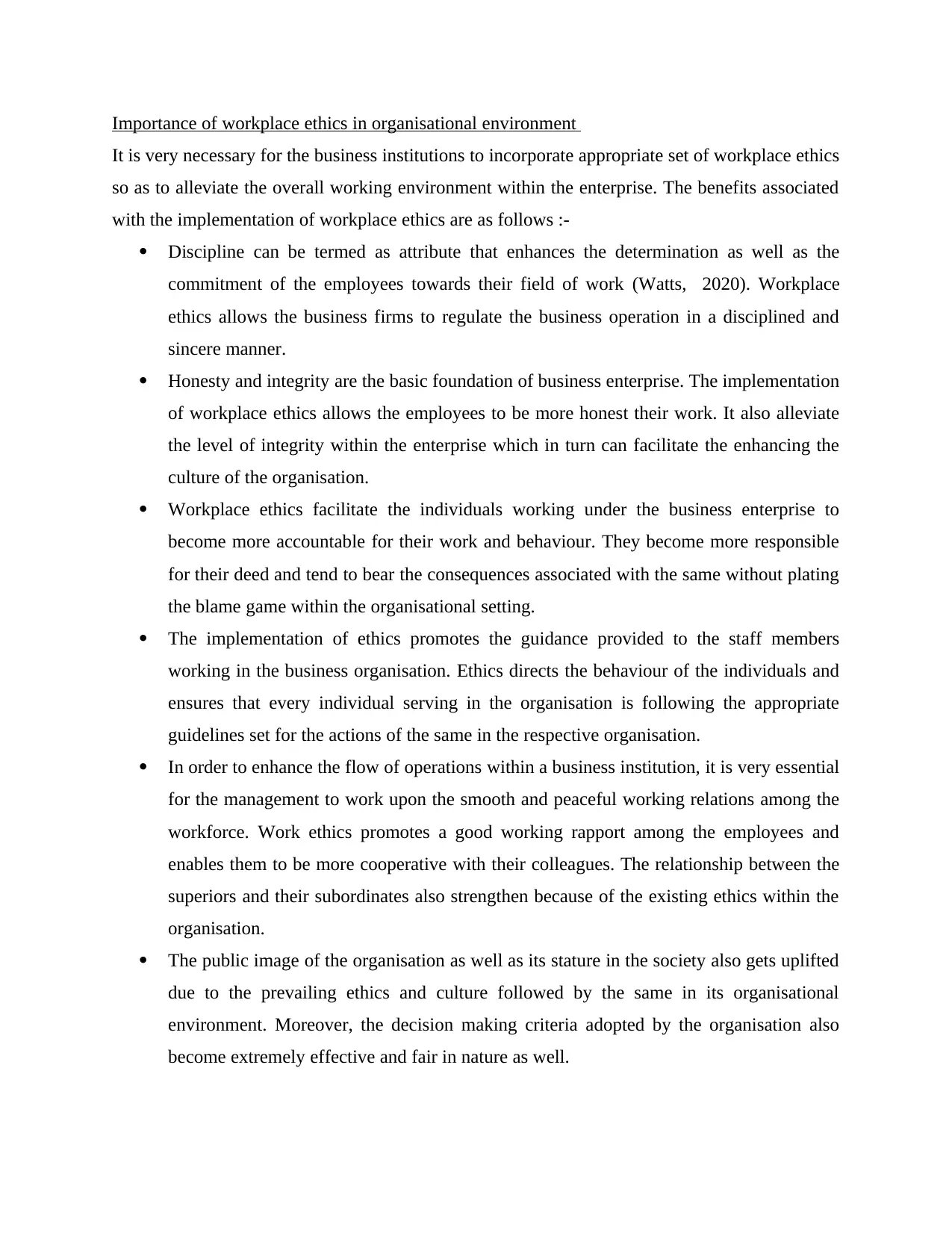
Importance of workplace ethics in organisational environment
It is very necessary for the business institutions to incorporate appropriate set of workplace ethics
so as to alleviate the overall working environment within the enterprise. The benefits associated
with the implementation of workplace ethics are as follows :-
Discipline can be termed as attribute that enhances the determination as well as the
commitment of the employees towards their field of work (Watts, 2020). Workplace
ethics allows the business firms to regulate the business operation in a disciplined and
sincere manner.
Honesty and integrity are the basic foundation of business enterprise. The implementation
of workplace ethics allows the employees to be more honest their work. It also alleviate
the level of integrity within the enterprise which in turn can facilitate the enhancing the
culture of the organisation.
Workplace ethics facilitate the individuals working under the business enterprise to
become more accountable for their work and behaviour. They become more responsible
for their deed and tend to bear the consequences associated with the same without plating
the blame game within the organisational setting.
The implementation of ethics promotes the guidance provided to the staff members
working in the business organisation. Ethics directs the behaviour of the individuals and
ensures that every individual serving in the organisation is following the appropriate
guidelines set for the actions of the same in the respective organisation.
In order to enhance the flow of operations within a business institution, it is very essential
for the management to work upon the smooth and peaceful working relations among the
workforce. Work ethics promotes a good working rapport among the employees and
enables them to be more cooperative with their colleagues. The relationship between the
superiors and their subordinates also strengthen because of the existing ethics within the
organisation.
The public image of the organisation as well as its stature in the society also gets uplifted
due to the prevailing ethics and culture followed by the same in its organisational
environment. Moreover, the decision making criteria adopted by the organisation also
become extremely effective and fair in nature as well.
It is very necessary for the business institutions to incorporate appropriate set of workplace ethics
so as to alleviate the overall working environment within the enterprise. The benefits associated
with the implementation of workplace ethics are as follows :-
Discipline can be termed as attribute that enhances the determination as well as the
commitment of the employees towards their field of work (Watts, 2020). Workplace
ethics allows the business firms to regulate the business operation in a disciplined and
sincere manner.
Honesty and integrity are the basic foundation of business enterprise. The implementation
of workplace ethics allows the employees to be more honest their work. It also alleviate
the level of integrity within the enterprise which in turn can facilitate the enhancing the
culture of the organisation.
Workplace ethics facilitate the individuals working under the business enterprise to
become more accountable for their work and behaviour. They become more responsible
for their deed and tend to bear the consequences associated with the same without plating
the blame game within the organisational setting.
The implementation of ethics promotes the guidance provided to the staff members
working in the business organisation. Ethics directs the behaviour of the individuals and
ensures that every individual serving in the organisation is following the appropriate
guidelines set for the actions of the same in the respective organisation.
In order to enhance the flow of operations within a business institution, it is very essential
for the management to work upon the smooth and peaceful working relations among the
workforce. Work ethics promotes a good working rapport among the employees and
enables them to be more cooperative with their colleagues. The relationship between the
superiors and their subordinates also strengthen because of the existing ethics within the
organisation.
The public image of the organisation as well as its stature in the society also gets uplifted
due to the prevailing ethics and culture followed by the same in its organisational
environment. Moreover, the decision making criteria adopted by the organisation also
become extremely effective and fair in nature as well.
Paraphrase This Document
Need a fresh take? Get an instant paraphrase of this document with our AI Paraphraser
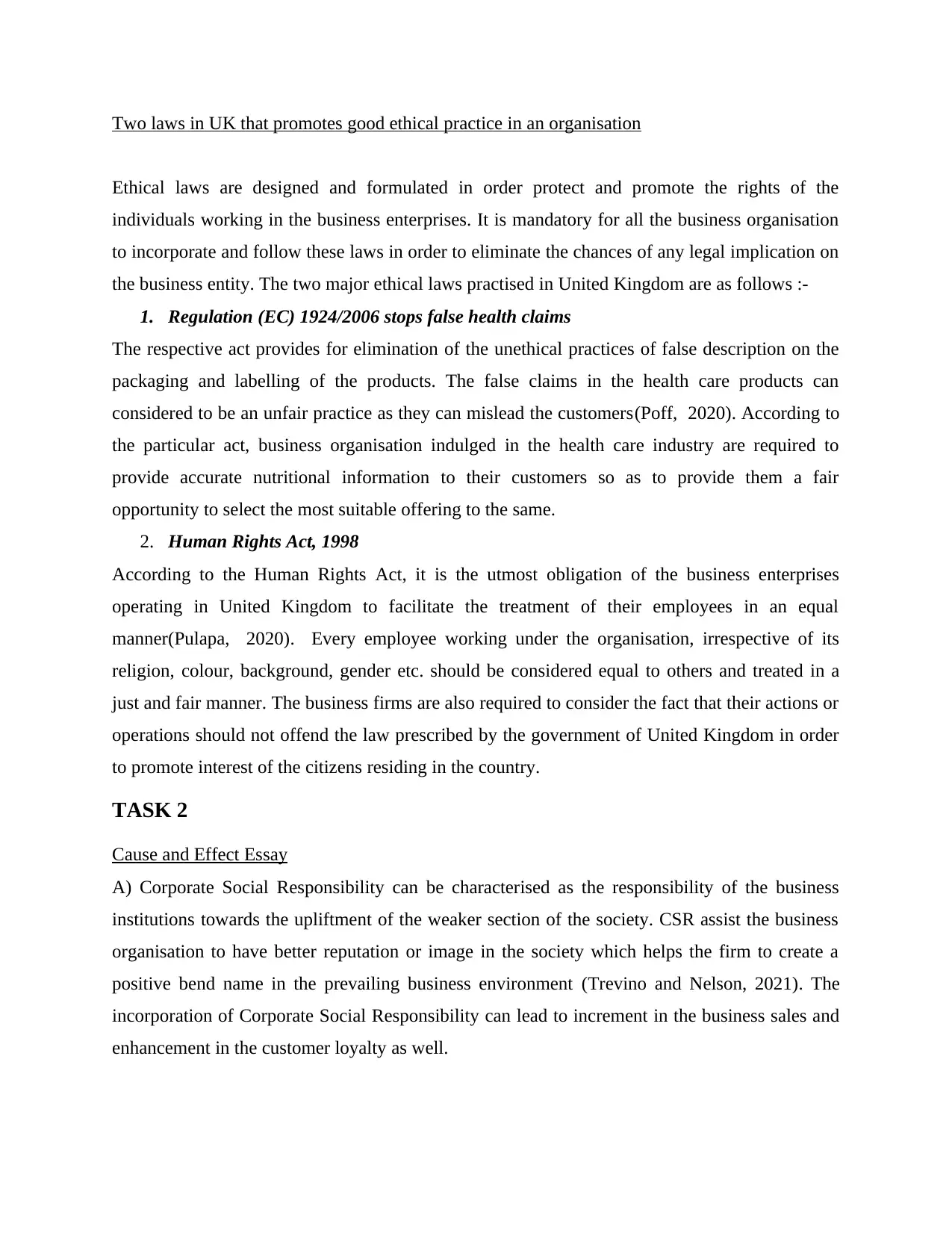
Two laws in UK that promotes good ethical practice in an organisation
Ethical laws are designed and formulated in order protect and promote the rights of the
individuals working in the business enterprises. It is mandatory for all the business organisation
to incorporate and follow these laws in order to eliminate the chances of any legal implication on
the business entity. The two major ethical laws practised in United Kingdom are as follows :-
1. Regulation (EC) 1924/2006 stops false health claims
The respective act provides for elimination of the unethical practices of false description on the
packaging and labelling of the products. The false claims in the health care products can
considered to be an unfair practice as they can mislead the customers(Poff, 2020). According to
the particular act, business organisation indulged in the health care industry are required to
provide accurate nutritional information to their customers so as to provide them a fair
opportunity to select the most suitable offering to the same.
2. Human Rights Act, 1998
According to the Human Rights Act, it is the utmost obligation of the business enterprises
operating in United Kingdom to facilitate the treatment of their employees in an equal
manner(Pulapa, 2020). Every employee working under the organisation, irrespective of its
religion, colour, background, gender etc. should be considered equal to others and treated in a
just and fair manner. The business firms are also required to consider the fact that their actions or
operations should not offend the law prescribed by the government of United Kingdom in order
to promote interest of the citizens residing in the country.
TASK 2
Cause and Effect Essay
A) Corporate Social Responsibility can be characterised as the responsibility of the business
institutions towards the upliftment of the weaker section of the society. CSR assist the business
organisation to have better reputation or image in the society which helps the firm to create a
positive bend name in the prevailing business environment (Trevino and Nelson, 2021). The
incorporation of Corporate Social Responsibility can lead to increment in the business sales and
enhancement in the customer loyalty as well.
Ethical laws are designed and formulated in order protect and promote the rights of the
individuals working in the business enterprises. It is mandatory for all the business organisation
to incorporate and follow these laws in order to eliminate the chances of any legal implication on
the business entity. The two major ethical laws practised in United Kingdom are as follows :-
1. Regulation (EC) 1924/2006 stops false health claims
The respective act provides for elimination of the unethical practices of false description on the
packaging and labelling of the products. The false claims in the health care products can
considered to be an unfair practice as they can mislead the customers(Poff, 2020). According to
the particular act, business organisation indulged in the health care industry are required to
provide accurate nutritional information to their customers so as to provide them a fair
opportunity to select the most suitable offering to the same.
2. Human Rights Act, 1998
According to the Human Rights Act, it is the utmost obligation of the business enterprises
operating in United Kingdom to facilitate the treatment of their employees in an equal
manner(Pulapa, 2020). Every employee working under the organisation, irrespective of its
religion, colour, background, gender etc. should be considered equal to others and treated in a
just and fair manner. The business firms are also required to consider the fact that their actions or
operations should not offend the law prescribed by the government of United Kingdom in order
to promote interest of the citizens residing in the country.
TASK 2
Cause and Effect Essay
A) Corporate Social Responsibility can be characterised as the responsibility of the business
institutions towards the upliftment of the weaker section of the society. CSR assist the business
organisation to have better reputation or image in the society which helps the firm to create a
positive bend name in the prevailing business environment (Trevino and Nelson, 2021). The
incorporation of Corporate Social Responsibility can lead to increment in the business sales and
enhancement in the customer loyalty as well.
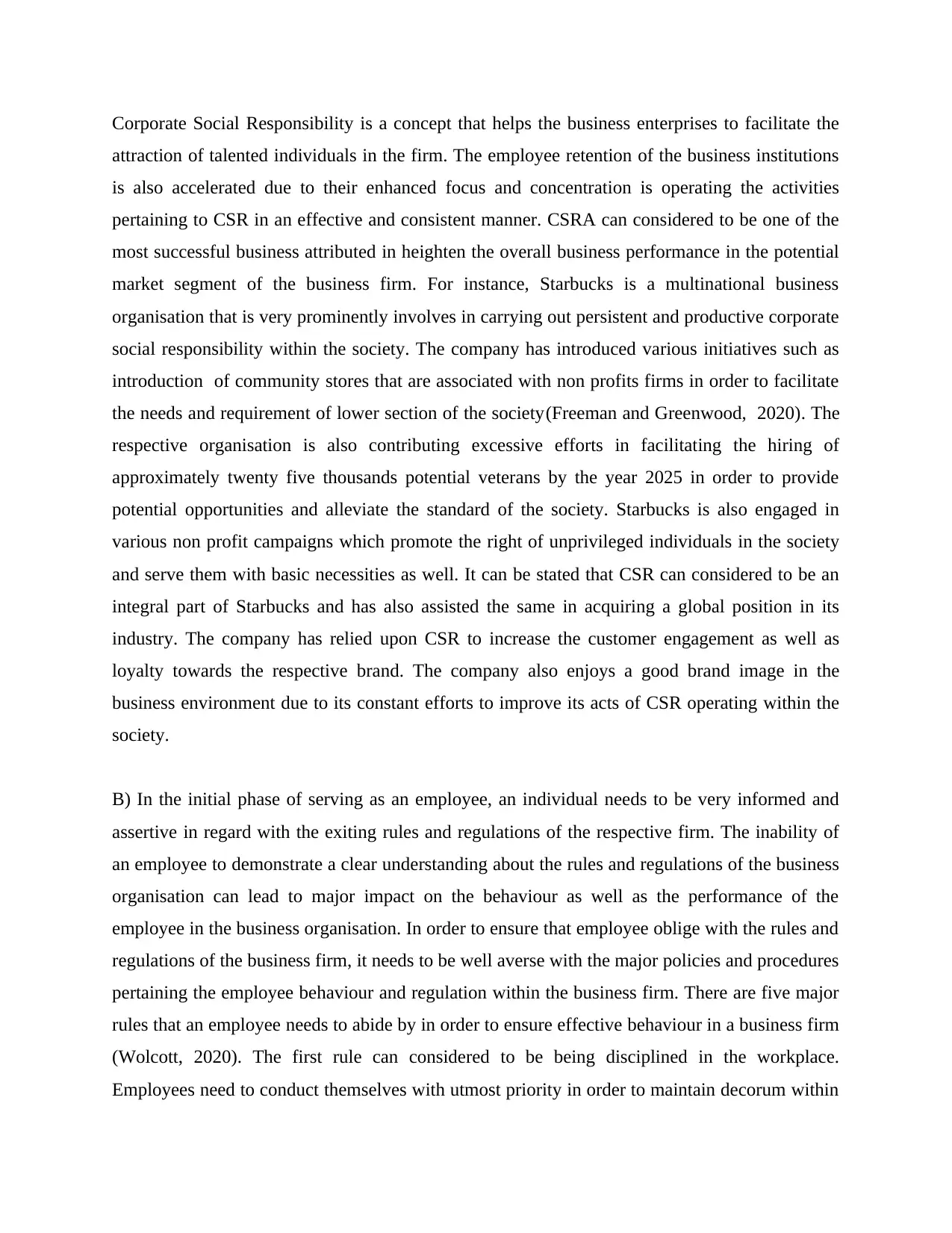
Corporate Social Responsibility is a concept that helps the business enterprises to facilitate the
attraction of talented individuals in the firm. The employee retention of the business institutions
is also accelerated due to their enhanced focus and concentration is operating the activities
pertaining to CSR in an effective and consistent manner. CSRA can considered to be one of the
most successful business attributed in heighten the overall business performance in the potential
market segment of the business firm. For instance, Starbucks is a multinational business
organisation that is very prominently involves in carrying out persistent and productive corporate
social responsibility within the society. The company has introduced various initiatives such as
introduction of community stores that are associated with non profits firms in order to facilitate
the needs and requirement of lower section of the society(Freeman and Greenwood, 2020). The
respective organisation is also contributing excessive efforts in facilitating the hiring of
approximately twenty five thousands potential veterans by the year 2025 in order to provide
potential opportunities and alleviate the standard of the society. Starbucks is also engaged in
various non profit campaigns which promote the right of unprivileged individuals in the society
and serve them with basic necessities as well. It can be stated that CSR can considered to be an
integral part of Starbucks and has also assisted the same in acquiring a global position in its
industry. The company has relied upon CSR to increase the customer engagement as well as
loyalty towards the respective brand. The company also enjoys a good brand image in the
business environment due to its constant efforts to improve its acts of CSR operating within the
society.
B) In the initial phase of serving as an employee, an individual needs to be very informed and
assertive in regard with the exiting rules and regulations of the respective firm. The inability of
an employee to demonstrate a clear understanding about the rules and regulations of the business
organisation can lead to major impact on the behaviour as well as the performance of the
employee in the business organisation. In order to ensure that employee oblige with the rules and
regulations of the business firm, it needs to be well averse with the major policies and procedures
pertaining the employee behaviour and regulation within the business firm. There are five major
rules that an employee needs to abide by in order to ensure effective behaviour in a business firm
(Wolcott, 2020). The first rule can considered to be being disciplined in the workplace.
Employees need to conduct themselves with utmost priority in order to maintain decorum within
attraction of talented individuals in the firm. The employee retention of the business institutions
is also accelerated due to their enhanced focus and concentration is operating the activities
pertaining to CSR in an effective and consistent manner. CSRA can considered to be one of the
most successful business attributed in heighten the overall business performance in the potential
market segment of the business firm. For instance, Starbucks is a multinational business
organisation that is very prominently involves in carrying out persistent and productive corporate
social responsibility within the society. The company has introduced various initiatives such as
introduction of community stores that are associated with non profits firms in order to facilitate
the needs and requirement of lower section of the society(Freeman and Greenwood, 2020). The
respective organisation is also contributing excessive efforts in facilitating the hiring of
approximately twenty five thousands potential veterans by the year 2025 in order to provide
potential opportunities and alleviate the standard of the society. Starbucks is also engaged in
various non profit campaigns which promote the right of unprivileged individuals in the society
and serve them with basic necessities as well. It can be stated that CSR can considered to be an
integral part of Starbucks and has also assisted the same in acquiring a global position in its
industry. The company has relied upon CSR to increase the customer engagement as well as
loyalty towards the respective brand. The company also enjoys a good brand image in the
business environment due to its constant efforts to improve its acts of CSR operating within the
society.
B) In the initial phase of serving as an employee, an individual needs to be very informed and
assertive in regard with the exiting rules and regulations of the respective firm. The inability of
an employee to demonstrate a clear understanding about the rules and regulations of the business
organisation can lead to major impact on the behaviour as well as the performance of the
employee in the business organisation. In order to ensure that employee oblige with the rules and
regulations of the business firm, it needs to be well averse with the major policies and procedures
pertaining the employee behaviour and regulation within the business firm. There are five major
rules that an employee needs to abide by in order to ensure effective behaviour in a business firm
(Wolcott, 2020). The first rule can considered to be being disciplined in the workplace.
Employees need to conduct themselves with utmost priority in order to maintain decorum within
⊘ This is a preview!⊘
Do you want full access?
Subscribe today to unlock all pages.

Trusted by 1+ million students worldwide
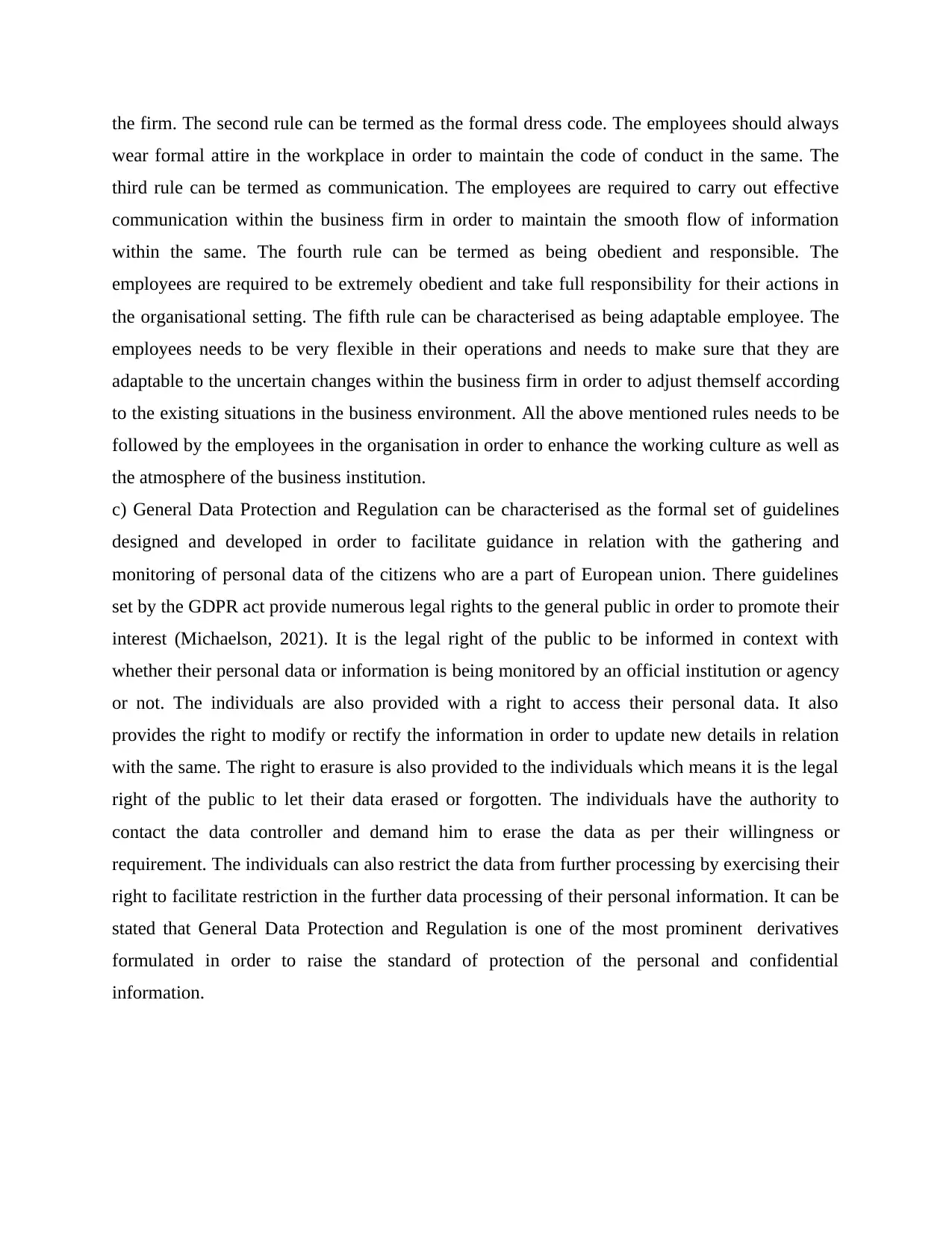
the firm. The second rule can be termed as the formal dress code. The employees should always
wear formal attire in the workplace in order to maintain the code of conduct in the same. The
third rule can be termed as communication. The employees are required to carry out effective
communication within the business firm in order to maintain the smooth flow of information
within the same. The fourth rule can be termed as being obedient and responsible. The
employees are required to be extremely obedient and take full responsibility for their actions in
the organisational setting. The fifth rule can be characterised as being adaptable employee. The
employees needs to be very flexible in their operations and needs to make sure that they are
adaptable to the uncertain changes within the business firm in order to adjust themself according
to the existing situations in the business environment. All the above mentioned rules needs to be
followed by the employees in the organisation in order to enhance the working culture as well as
the atmosphere of the business institution.
c) General Data Protection and Regulation can be characterised as the formal set of guidelines
designed and developed in order to facilitate guidance in relation with the gathering and
monitoring of personal data of the citizens who are a part of European union. There guidelines
set by the GDPR act provide numerous legal rights to the general public in order to promote their
interest (Michaelson, 2021). It is the legal right of the public to be informed in context with
whether their personal data or information is being monitored by an official institution or agency
or not. The individuals are also provided with a right to access their personal data. It also
provides the right to modify or rectify the information in order to update new details in relation
with the same. The right to erasure is also provided to the individuals which means it is the legal
right of the public to let their data erased or forgotten. The individuals have the authority to
contact the data controller and demand him to erase the data as per their willingness or
requirement. The individuals can also restrict the data from further processing by exercising their
right to facilitate restriction in the further data processing of their personal information. It can be
stated that General Data Protection and Regulation is one of the most prominent derivatives
formulated in order to raise the standard of protection of the personal and confidential
information.
wear formal attire in the workplace in order to maintain the code of conduct in the same. The
third rule can be termed as communication. The employees are required to carry out effective
communication within the business firm in order to maintain the smooth flow of information
within the same. The fourth rule can be termed as being obedient and responsible. The
employees are required to be extremely obedient and take full responsibility for their actions in
the organisational setting. The fifth rule can be characterised as being adaptable employee. The
employees needs to be very flexible in their operations and needs to make sure that they are
adaptable to the uncertain changes within the business firm in order to adjust themself according
to the existing situations in the business environment. All the above mentioned rules needs to be
followed by the employees in the organisation in order to enhance the working culture as well as
the atmosphere of the business institution.
c) General Data Protection and Regulation can be characterised as the formal set of guidelines
designed and developed in order to facilitate guidance in relation with the gathering and
monitoring of personal data of the citizens who are a part of European union. There guidelines
set by the GDPR act provide numerous legal rights to the general public in order to promote their
interest (Michaelson, 2021). It is the legal right of the public to be informed in context with
whether their personal data or information is being monitored by an official institution or agency
or not. The individuals are also provided with a right to access their personal data. It also
provides the right to modify or rectify the information in order to update new details in relation
with the same. The right to erasure is also provided to the individuals which means it is the legal
right of the public to let their data erased or forgotten. The individuals have the authority to
contact the data controller and demand him to erase the data as per their willingness or
requirement. The individuals can also restrict the data from further processing by exercising their
right to facilitate restriction in the further data processing of their personal information. It can be
stated that General Data Protection and Regulation is one of the most prominent derivatives
formulated in order to raise the standard of protection of the personal and confidential
information.
Paraphrase This Document
Need a fresh take? Get an instant paraphrase of this document with our AI Paraphraser
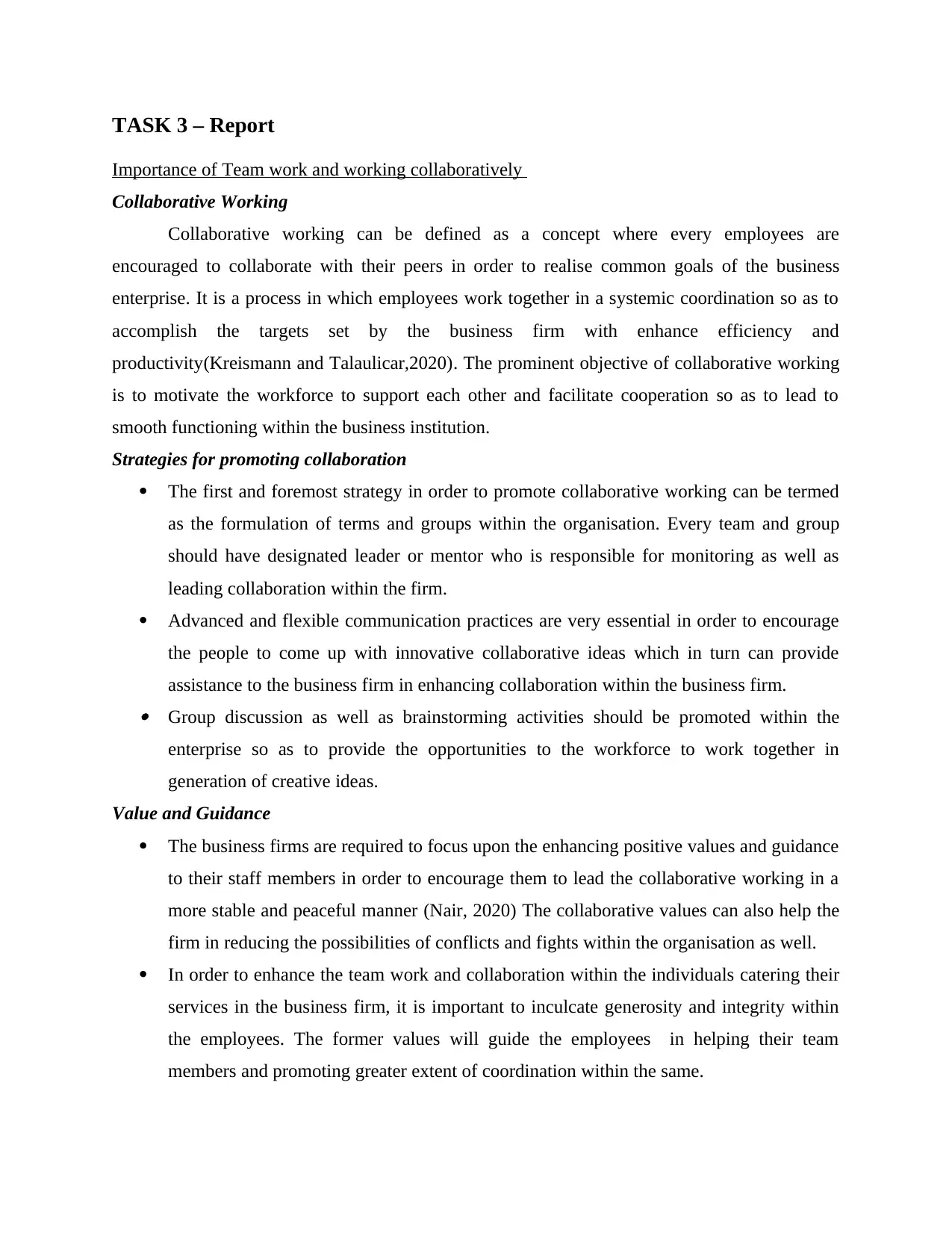
TASK 3 – Report
Importance of Team work and working collaboratively
Collaborative Working
Collaborative working can be defined as a concept where every employees are
encouraged to collaborate with their peers in order to realise common goals of the business
enterprise. It is a process in which employees work together in a systemic coordination so as to
accomplish the targets set by the business firm with enhance efficiency and
productivity(Kreismann and Talaulicar,2020). The prominent objective of collaborative working
is to motivate the workforce to support each other and facilitate cooperation so as to lead to
smooth functioning within the business institution.
Strategies for promoting collaboration
The first and foremost strategy in order to promote collaborative working can be termed
as the formulation of terms and groups within the organisation. Every team and group
should have designated leader or mentor who is responsible for monitoring as well as
leading collaboration within the firm.
Advanced and flexible communication practices are very essential in order to encourage
the people to come up with innovative collaborative ideas which in turn can provide
assistance to the business firm in enhancing collaboration within the business firm. Group discussion as well as brainstorming activities should be promoted within the
enterprise so as to provide the opportunities to the workforce to work together in
generation of creative ideas.
Value and Guidance
The business firms are required to focus upon the enhancing positive values and guidance
to their staff members in order to encourage them to lead the collaborative working in a
more stable and peaceful manner (Nair, 2020) The collaborative values can also help the
firm in reducing the possibilities of conflicts and fights within the organisation as well.
In order to enhance the team work and collaboration within the individuals catering their
services in the business firm, it is important to inculcate generosity and integrity within
the employees. The former values will guide the employees in helping their team
members and promoting greater extent of coordination within the same.
Importance of Team work and working collaboratively
Collaborative Working
Collaborative working can be defined as a concept where every employees are
encouraged to collaborate with their peers in order to realise common goals of the business
enterprise. It is a process in which employees work together in a systemic coordination so as to
accomplish the targets set by the business firm with enhance efficiency and
productivity(Kreismann and Talaulicar,2020). The prominent objective of collaborative working
is to motivate the workforce to support each other and facilitate cooperation so as to lead to
smooth functioning within the business institution.
Strategies for promoting collaboration
The first and foremost strategy in order to promote collaborative working can be termed
as the formulation of terms and groups within the organisation. Every team and group
should have designated leader or mentor who is responsible for monitoring as well as
leading collaboration within the firm.
Advanced and flexible communication practices are very essential in order to encourage
the people to come up with innovative collaborative ideas which in turn can provide
assistance to the business firm in enhancing collaboration within the business firm. Group discussion as well as brainstorming activities should be promoted within the
enterprise so as to provide the opportunities to the workforce to work together in
generation of creative ideas.
Value and Guidance
The business firms are required to focus upon the enhancing positive values and guidance
to their staff members in order to encourage them to lead the collaborative working in a
more stable and peaceful manner (Nair, 2020) The collaborative values can also help the
firm in reducing the possibilities of conflicts and fights within the organisation as well.
In order to enhance the team work and collaboration within the individuals catering their
services in the business firm, it is important to inculcate generosity and integrity within
the employees. The former values will guide the employees in helping their team
members and promoting greater extent of coordination within the same.
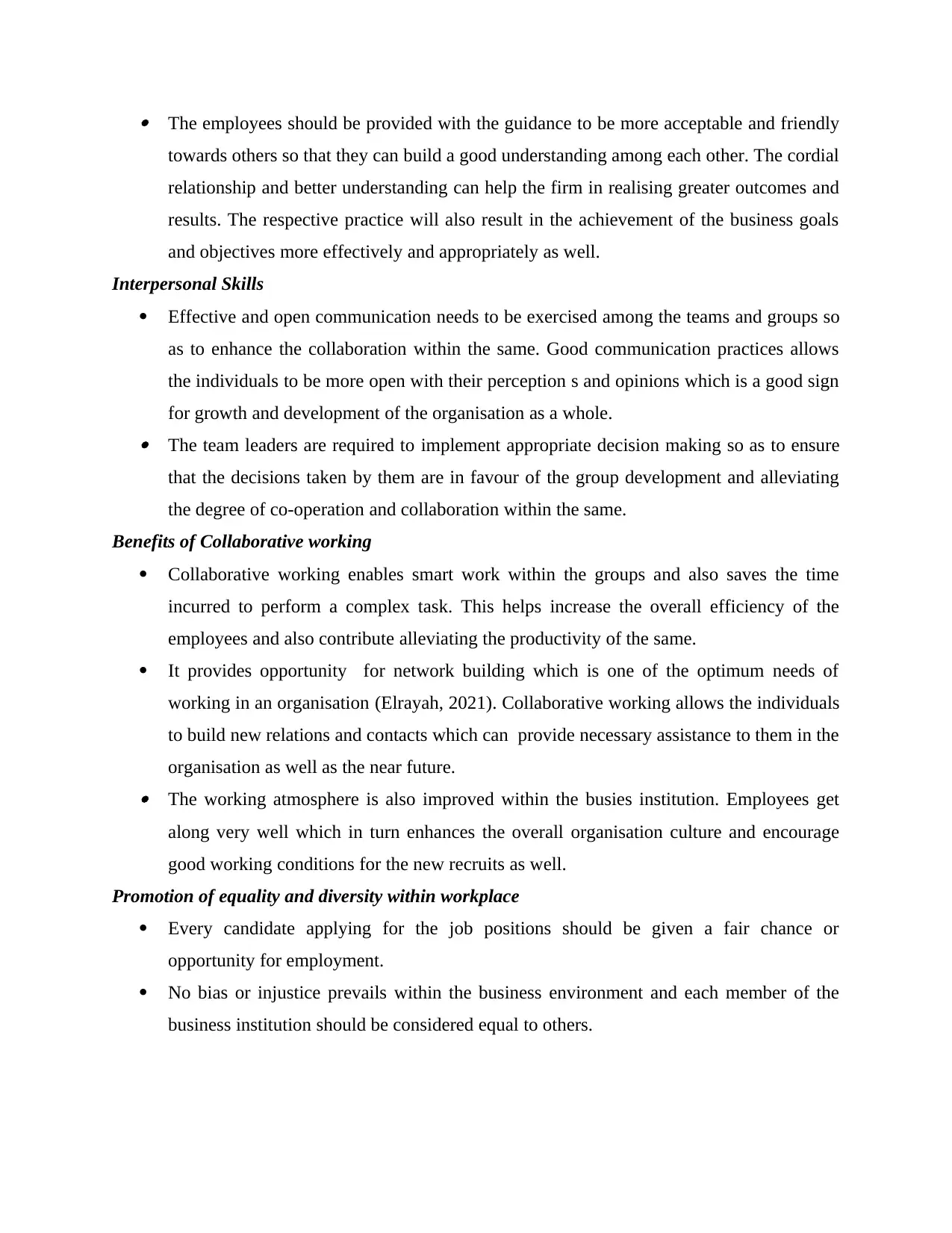
The employees should be provided with the guidance to be more acceptable and friendly
towards others so that they can build a good understanding among each other. The cordial
relationship and better understanding can help the firm in realising greater outcomes and
results. The respective practice will also result in the achievement of the business goals
and objectives more effectively and appropriately as well.
Interpersonal Skills
Effective and open communication needs to be exercised among the teams and groups so
as to enhance the collaboration within the same. Good communication practices allows
the individuals to be more open with their perception s and opinions which is a good sign
for growth and development of the organisation as a whole. The team leaders are required to implement appropriate decision making so as to ensure
that the decisions taken by them are in favour of the group development and alleviating
the degree of co-operation and collaboration within the same.
Benefits of Collaborative working
Collaborative working enables smart work within the groups and also saves the time
incurred to perform a complex task. This helps increase the overall efficiency of the
employees and also contribute alleviating the productivity of the same.
It provides opportunity for network building which is one of the optimum needs of
working in an organisation (Elrayah, 2021). Collaborative working allows the individuals
to build new relations and contacts which can provide necessary assistance to them in the
organisation as well as the near future. The working atmosphere is also improved within the busies institution. Employees get
along very well which in turn enhances the overall organisation culture and encourage
good working conditions for the new recruits as well.
Promotion of equality and diversity within workplace
Every candidate applying for the job positions should be given a fair chance or
opportunity for employment.
No bias or injustice prevails within the business environment and each member of the
business institution should be considered equal to others.
towards others so that they can build a good understanding among each other. The cordial
relationship and better understanding can help the firm in realising greater outcomes and
results. The respective practice will also result in the achievement of the business goals
and objectives more effectively and appropriately as well.
Interpersonal Skills
Effective and open communication needs to be exercised among the teams and groups so
as to enhance the collaboration within the same. Good communication practices allows
the individuals to be more open with their perception s and opinions which is a good sign
for growth and development of the organisation as a whole. The team leaders are required to implement appropriate decision making so as to ensure
that the decisions taken by them are in favour of the group development and alleviating
the degree of co-operation and collaboration within the same.
Benefits of Collaborative working
Collaborative working enables smart work within the groups and also saves the time
incurred to perform a complex task. This helps increase the overall efficiency of the
employees and also contribute alleviating the productivity of the same.
It provides opportunity for network building which is one of the optimum needs of
working in an organisation (Elrayah, 2021). Collaborative working allows the individuals
to build new relations and contacts which can provide necessary assistance to them in the
organisation as well as the near future. The working atmosphere is also improved within the busies institution. Employees get
along very well which in turn enhances the overall organisation culture and encourage
good working conditions for the new recruits as well.
Promotion of equality and diversity within workplace
Every candidate applying for the job positions should be given a fair chance or
opportunity for employment.
No bias or injustice prevails within the business environment and each member of the
business institution should be considered equal to others.
⊘ This is a preview!⊘
Do you want full access?
Subscribe today to unlock all pages.

Trusted by 1+ million students worldwide
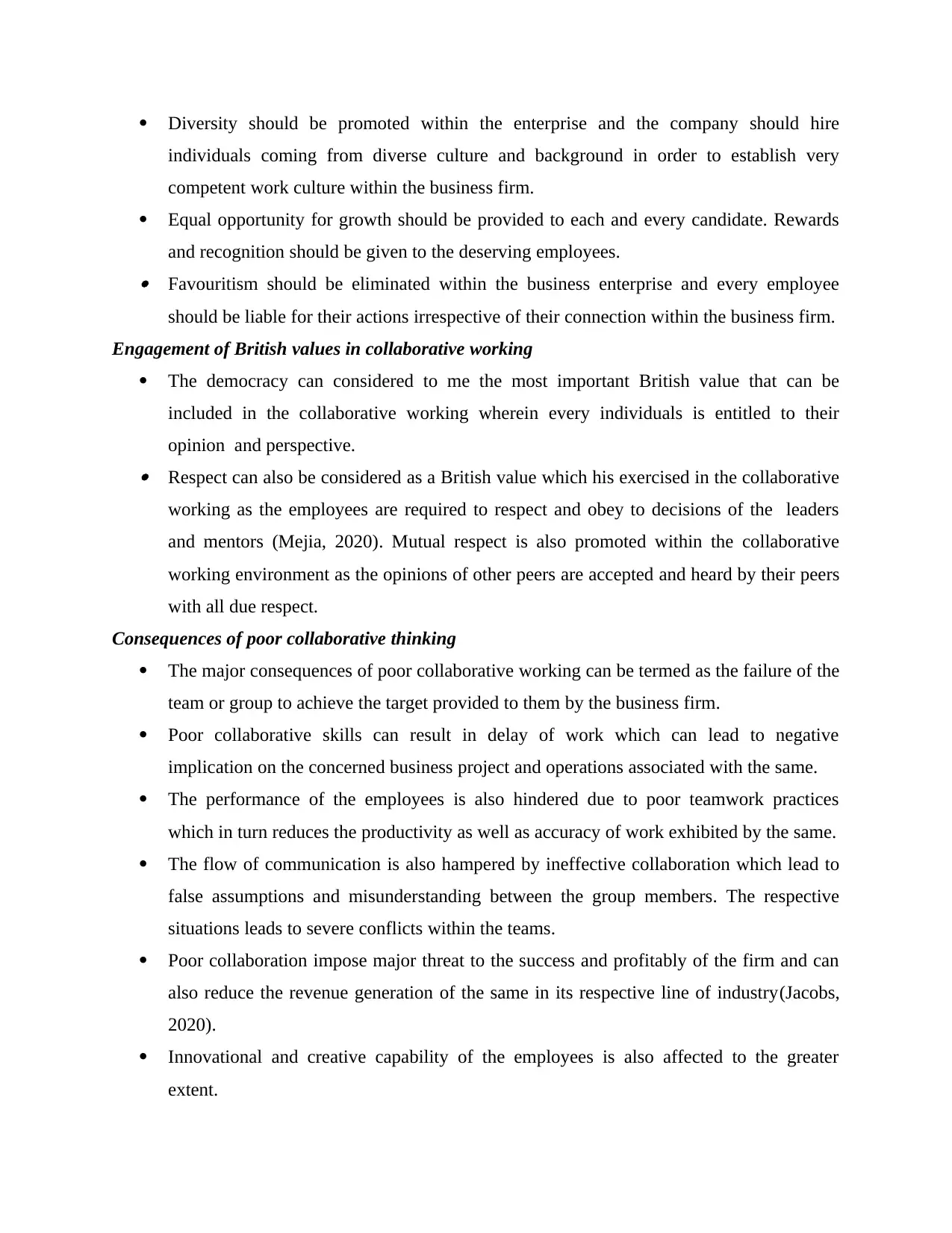
Diversity should be promoted within the enterprise and the company should hire
individuals coming from diverse culture and background in order to establish very
competent work culture within the business firm.
Equal opportunity for growth should be provided to each and every candidate. Rewards
and recognition should be given to the deserving employees. Favouritism should be eliminated within the business enterprise and every employee
should be liable for their actions irrespective of their connection within the business firm.
Engagement of British values in collaborative working
The democracy can considered to me the most important British value that can be
included in the collaborative working wherein every individuals is entitled to their
opinion and perspective. Respect can also be considered as a British value which his exercised in the collaborative
working as the employees are required to respect and obey to decisions of the leaders
and mentors (Mejia, 2020). Mutual respect is also promoted within the collaborative
working environment as the opinions of other peers are accepted and heard by their peers
with all due respect.
Consequences of poor collaborative thinking
The major consequences of poor collaborative working can be termed as the failure of the
team or group to achieve the target provided to them by the business firm.
Poor collaborative skills can result in delay of work which can lead to negative
implication on the concerned business project and operations associated with the same.
The performance of the employees is also hindered due to poor teamwork practices
which in turn reduces the productivity as well as accuracy of work exhibited by the same.
The flow of communication is also hampered by ineffective collaboration which lead to
false assumptions and misunderstanding between the group members. The respective
situations leads to severe conflicts within the teams.
Poor collaboration impose major threat to the success and profitably of the firm and can
also reduce the revenue generation of the same in its respective line of industry(Jacobs,
2020).
Innovational and creative capability of the employees is also affected to the greater
extent.
individuals coming from diverse culture and background in order to establish very
competent work culture within the business firm.
Equal opportunity for growth should be provided to each and every candidate. Rewards
and recognition should be given to the deserving employees. Favouritism should be eliminated within the business enterprise and every employee
should be liable for their actions irrespective of their connection within the business firm.
Engagement of British values in collaborative working
The democracy can considered to me the most important British value that can be
included in the collaborative working wherein every individuals is entitled to their
opinion and perspective. Respect can also be considered as a British value which his exercised in the collaborative
working as the employees are required to respect and obey to decisions of the leaders
and mentors (Mejia, 2020). Mutual respect is also promoted within the collaborative
working environment as the opinions of other peers are accepted and heard by their peers
with all due respect.
Consequences of poor collaborative thinking
The major consequences of poor collaborative working can be termed as the failure of the
team or group to achieve the target provided to them by the business firm.
Poor collaborative skills can result in delay of work which can lead to negative
implication on the concerned business project and operations associated with the same.
The performance of the employees is also hindered due to poor teamwork practices
which in turn reduces the productivity as well as accuracy of work exhibited by the same.
The flow of communication is also hampered by ineffective collaboration which lead to
false assumptions and misunderstanding between the group members. The respective
situations leads to severe conflicts within the teams.
Poor collaboration impose major threat to the success and profitably of the firm and can
also reduce the revenue generation of the same in its respective line of industry(Jacobs,
2020).
Innovational and creative capability of the employees is also affected to the greater
extent.
Paraphrase This Document
Need a fresh take? Get an instant paraphrase of this document with our AI Paraphraser
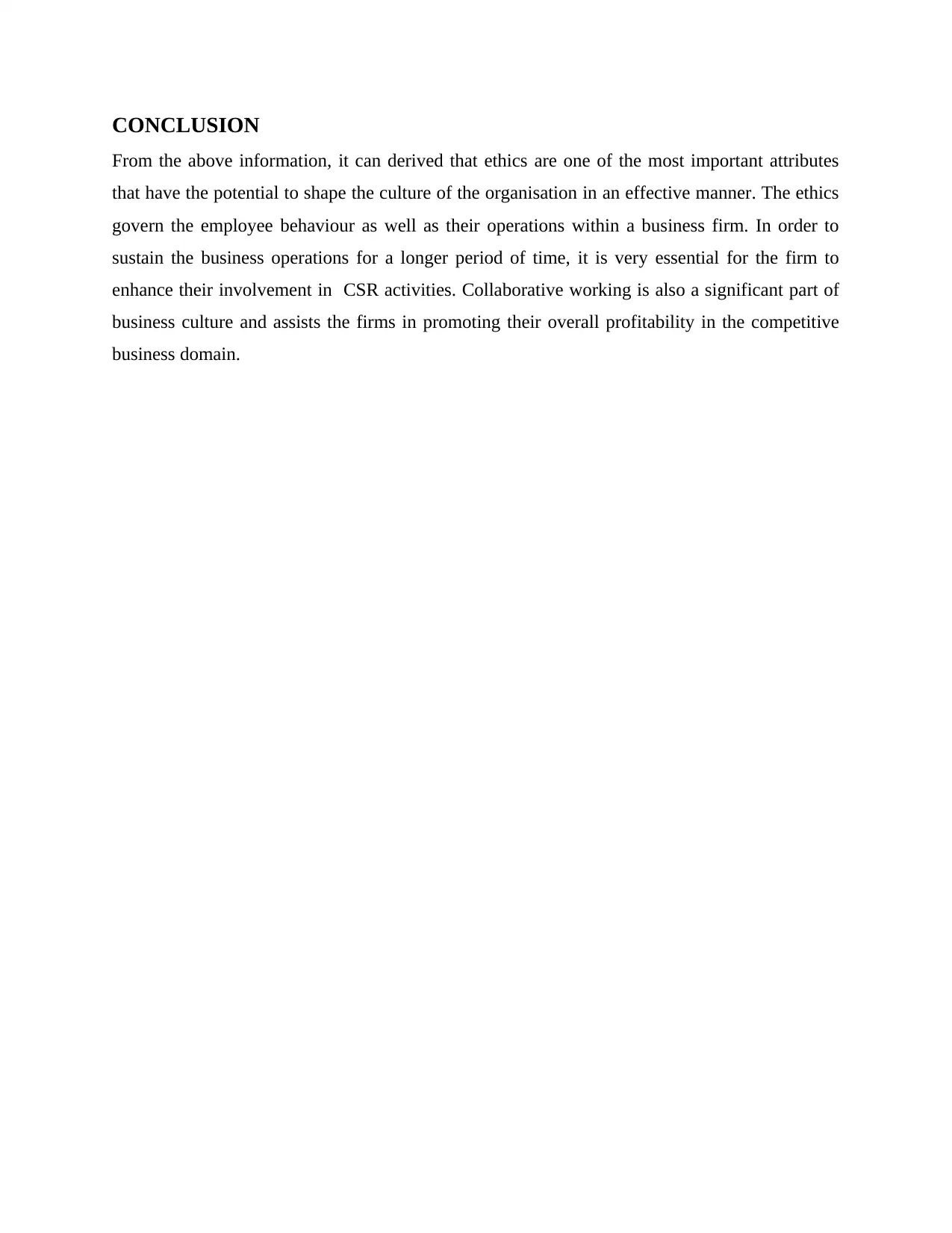
CONCLUSION
From the above information, it can derived that ethics are one of the most important attributes
that have the potential to shape the culture of the organisation in an effective manner. The ethics
govern the employee behaviour as well as their operations within a business firm. In order to
sustain the business operations for a longer period of time, it is very essential for the firm to
enhance their involvement in CSR activities. Collaborative working is also a significant part of
business culture and assists the firms in promoting their overall profitability in the competitive
business domain.
From the above information, it can derived that ethics are one of the most important attributes
that have the potential to shape the culture of the organisation in an effective manner. The ethics
govern the employee behaviour as well as their operations within a business firm. In order to
sustain the business operations for a longer period of time, it is very essential for the firm to
enhance their involvement in CSR activities. Collaborative working is also a significant part of
business culture and assists the firms in promoting their overall profitability in the competitive
business domain.
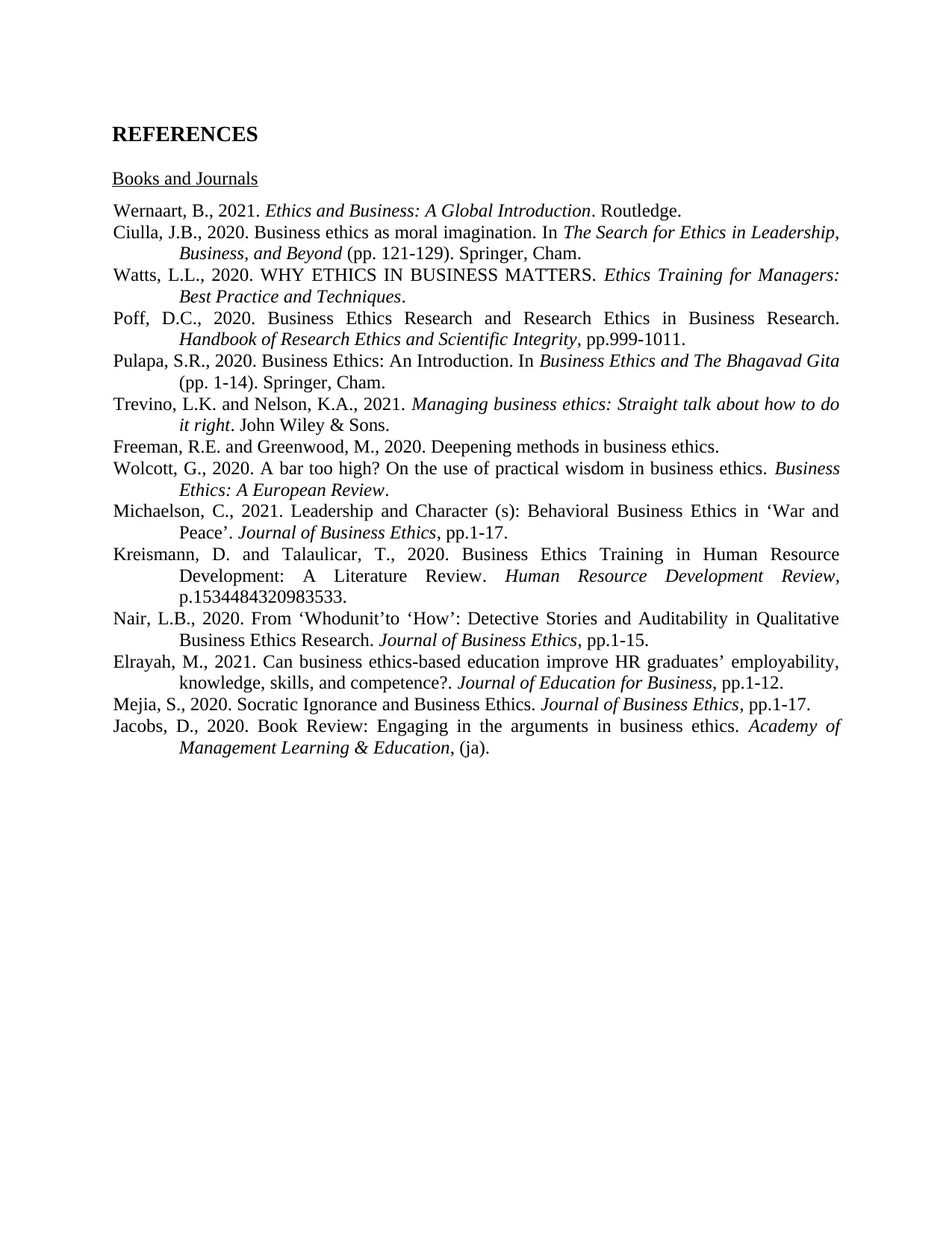
REFERENCES
Books and Journals
Wernaart, B., 2021. Ethics and Business: A Global Introduction. Routledge.
Ciulla, J.B., 2020. Business ethics as moral imagination. In The Search for Ethics in Leadership,
Business, and Beyond (pp. 121-129). Springer, Cham.
Watts, L.L., 2020. WHY ETHICS IN BUSINESS MATTERS. Ethics Training for Managers:
Best Practice and Techniques.
Poff, D.C., 2020. Business Ethics Research and Research Ethics in Business Research.
Handbook of Research Ethics and Scientific Integrity, pp.999-1011.
Pulapa, S.R., 2020. Business Ethics: An Introduction. In Business Ethics and The Bhagavad Gita
(pp. 1-14). Springer, Cham.
Trevino, L.K. and Nelson, K.A., 2021. Managing business ethics: Straight talk about how to do
it right. John Wiley & Sons.
Freeman, R.E. and Greenwood, M., 2020. Deepening methods in business ethics.
Wolcott, G., 2020. A bar too high? On the use of practical wisdom in business ethics. Business
Ethics: A European Review.
Michaelson, C., 2021. Leadership and Character (s): Behavioral Business Ethics in ‘War and
Peace’. Journal of Business Ethics, pp.1-17.
Kreismann, D. and Talaulicar, T., 2020. Business Ethics Training in Human Resource
Development: A Literature Review. Human Resource Development Review,
p.1534484320983533.
Nair, L.B., 2020. From ‘Whodunit’to ‘How’: Detective Stories and Auditability in Qualitative
Business Ethics Research. Journal of Business Ethics, pp.1-15.
Elrayah, M., 2021. Can business ethics-based education improve HR graduates’ employability,
knowledge, skills, and competence?. Journal of Education for Business, pp.1-12.
Mejia, S., 2020. Socratic Ignorance and Business Ethics. Journal of Business Ethics, pp.1-17.
Jacobs, D., 2020. Book Review: Engaging in the arguments in business ethics. Academy of
Management Learning & Education, (ja).
Books and Journals
Wernaart, B., 2021. Ethics and Business: A Global Introduction. Routledge.
Ciulla, J.B., 2020. Business ethics as moral imagination. In The Search for Ethics in Leadership,
Business, and Beyond (pp. 121-129). Springer, Cham.
Watts, L.L., 2020. WHY ETHICS IN BUSINESS MATTERS. Ethics Training for Managers:
Best Practice and Techniques.
Poff, D.C., 2020. Business Ethics Research and Research Ethics in Business Research.
Handbook of Research Ethics and Scientific Integrity, pp.999-1011.
Pulapa, S.R., 2020. Business Ethics: An Introduction. In Business Ethics and The Bhagavad Gita
(pp. 1-14). Springer, Cham.
Trevino, L.K. and Nelson, K.A., 2021. Managing business ethics: Straight talk about how to do
it right. John Wiley & Sons.
Freeman, R.E. and Greenwood, M., 2020. Deepening methods in business ethics.
Wolcott, G., 2020. A bar too high? On the use of practical wisdom in business ethics. Business
Ethics: A European Review.
Michaelson, C., 2021. Leadership and Character (s): Behavioral Business Ethics in ‘War and
Peace’. Journal of Business Ethics, pp.1-17.
Kreismann, D. and Talaulicar, T., 2020. Business Ethics Training in Human Resource
Development: A Literature Review. Human Resource Development Review,
p.1534484320983533.
Nair, L.B., 2020. From ‘Whodunit’to ‘How’: Detective Stories and Auditability in Qualitative
Business Ethics Research. Journal of Business Ethics, pp.1-15.
Elrayah, M., 2021. Can business ethics-based education improve HR graduates’ employability,
knowledge, skills, and competence?. Journal of Education for Business, pp.1-12.
Mejia, S., 2020. Socratic Ignorance and Business Ethics. Journal of Business Ethics, pp.1-17.
Jacobs, D., 2020. Book Review: Engaging in the arguments in business ethics. Academy of
Management Learning & Education, (ja).
⊘ This is a preview!⊘
Do you want full access?
Subscribe today to unlock all pages.

Trusted by 1+ million students worldwide
1 out of 13
Related Documents
Your All-in-One AI-Powered Toolkit for Academic Success.
+13062052269
info@desklib.com
Available 24*7 on WhatsApp / Email
![[object Object]](/_next/static/media/star-bottom.7253800d.svg)
Unlock your academic potential
Copyright © 2020–2026 A2Z Services. All Rights Reserved. Developed and managed by ZUCOL.





